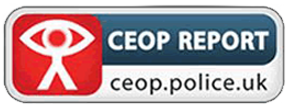Keeping Your Child Safe Online
If you come across anything on the internet that makes you feel unhappy, upset or uncomfortable you need to tell a trusted adult at home or at school. You can click on the sign below to go to a website called CEOP and find some more activities and report any concerns you have.

E-Safety
Staying safe online has never been more important or relevant to our pupils and families. In school, we help to keep the children safe through the use of filtering and monitoring systems provided by ATOM IT, which help us to block inappropriate content, but also monitor what children are searching for so that we can intervene where necessary. Additionally, Online Safety is a key part of the Computing subject curriculum at KS1 and KS2 (It exists in the 'Digital Literacy' strand) and is covered as part of our PSHE curriculum.
It is a life skill taught in school to be reinforced at home and can be practised daily through a consistent message at home and in school.
Below are a number of resources, links and documents that will help you as a parent not only to understand in more detail what is taught in school, but also how you can support your child at home, whatever their age.
Check that you have the appropriate controls on your devices using the link below:
https://www.internetmatters.org/parental-controls/
Common Sense Media Reviews on shows that your children might want to watch.
Parental Information Parental information for parents to explore the digital world.
ChildNet Key resources and help to keep children safe online.
Policies related to Online Safety:
Acceptable use of Mobile Phones Policy
ICT and Internet Acceptable Use Policy
Top Tips for Keeping Your Child Safe Online
- Talk to your child about what they’re up to online. Be a part of their online life; involve the whole family and show an interest. Find out what sites they visit and what they love about them, if they know you understand they are more likely to come to you if they have any problems. Watch Thinkuknow films and cartoons with your child. The www.thinkuknow.co.uk/parents has films, games and advice for child from five all the way to 16.
- Encourage your child to go online and explore! There is a wealth of age-appropriate sites online for your children. Encourage them to use sites which are fun, educational and that will help them to develop online skills.
- Keep up-to-date with your child’s development online. Children grow up fast and they will be growing in confidence and learning new skills daily. It’s important that as your child learns more, so do you.
- Set boundaries in the online world just as you would in the real world. Think about what they might see, what they share, who they talk to and how long they spend online. It is important to discuss boundaries at a young age to develop the tools and skills children need to enjoy their time online.
- Keep all equipment that connects to the internet in a family space. For children of this age, it is important to keep internet use in family areas so you can see the sites your child is using and be there for them if they stumble across something they don’t want to see.
- Know what connects to the internet and how. Nowadays even the TV connects to the internet. Make sure you’re aware of which devices that your child uses connect to the internet, such as their phone or games console. Also, find out how they are accessing the internet – is it your connection, or a neighbour’s wifi? This will affect whether the safety setting you set are being applied.
- Use parental controls on devices that link to the internet, such as the TV, laptops, computers, games consoles and mobile phones. Parental controls are not just about locking and blocking, they are a tool to help you set appropriate boundaries as your child grows and develops. They are not the answer to your child’s online safety, but they are a good start and they are not as difficult to install as you might think. Service providers are working hard to make them simple, effective and user friendly. There is a link on the 'Think u Know' website which can help you find your service provider and set your controls.
- Help your child to understand that they should never give out personal details to online friends—personal information includes their messanger ID, email address, mobile number and any pictures of themselves, their family and friends. If your child publishes a picture or video online, anyone can change it or share it. Remind them that anyone could be looking at their images!
- If you child receives spam/junk email and texts, remind them never to believe them, reply to them or use them. It’s not a good idea for your child to open files from people they don’t know. They won’t know what they contain—it could be a virus or worse—an inappropriate image or film.
- Help your child to understand that some people lie online and therefore it’s better to keep online mates online. They should never meet up with any strangers without an adult they trust.
- Teach your child how to block someone online and how to report them if they feel uncomfortable.
Support to help keep my child safe online
As your children spend more time at home and are going to be online more than ever, we’ve pulled together a list of useful links to help parents and carers.
-
ThinkuknowProvides advice from the National Crime Agency (NCA) to stay safe online.
-
Internet MattersProvides age-specific online safety checklists, guides on how to set parental controls on a range of devices and a host of practical tips to help children get the most out of their digital world.
-
LGfLSupport for parents and carers to keep their children safe online, including 6 top tips to keep primary aged children safe online.
-
Net AwareSupport for parents and carers from the NSPCC, providing a guide to social networks, apps and games.
-
UK Safer Internet CentreTips, advice, guides and resources to help keep children safe online, including parental controls offered by home internet providers and safety tools on social networks and other online services.
-
Staying Safe OnlineGovernment guidance offering advice on parental controls, fact-checking information, communicating with family and friends while social distancing is in place and taking regular breaks.
-
Read up on apps and games adviceClick on the link to take a look at online safety guidelines for parents from the National Online Safety website
-
Internet Matters - First Connected Device guide for Parents/carersDid your child receive their first device? If so, see our practical safety tips guide
NSPCC - Speak out. Stay safe.
The NSPCC have produced some excellent information leaflets and posters for parents/carers to start discussions and conversations with their children about keeping safe online and when using social media.
The posters cover topics such as:
- Grooming
- Sexting
- Snapchat
- Youtube
Our safeguarding and online safety training makes clear that we need to be teaching children in an age-appropriate way about how to keep safe. This includes working with families so that they understand the risks and problems that may arise.
Please take a look at the posters/leaflets and use them as a source of information or starting point for discussion
Digital Safety Training from KIDSCAPE
FREE Digital Safety training for parents and carers from KIDSCAPE
The training is designed to equip adults with the knowledge to understand the potential risks associated with keeping children and young people safe online, while also covering the many positives of the digital world. During the training, attendees will learn about harmful content online, cyberbullying, gaming, live-streaming, grooming, popular apps and social media, and much more.
